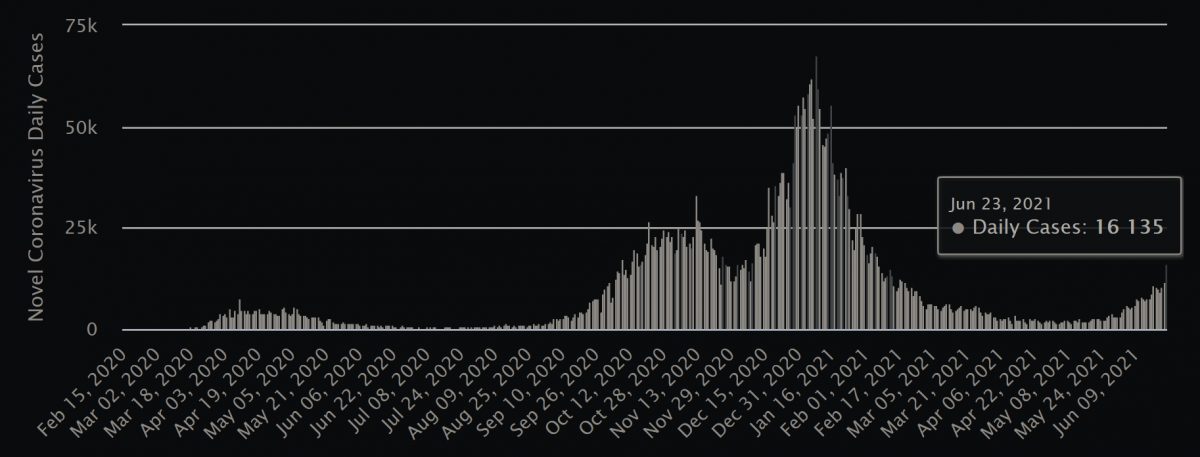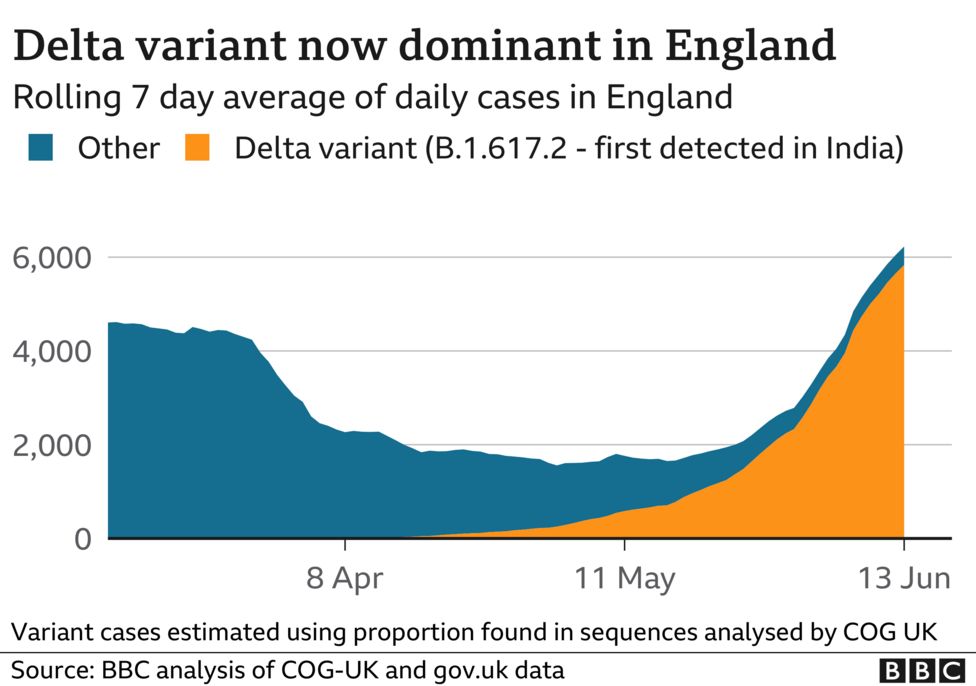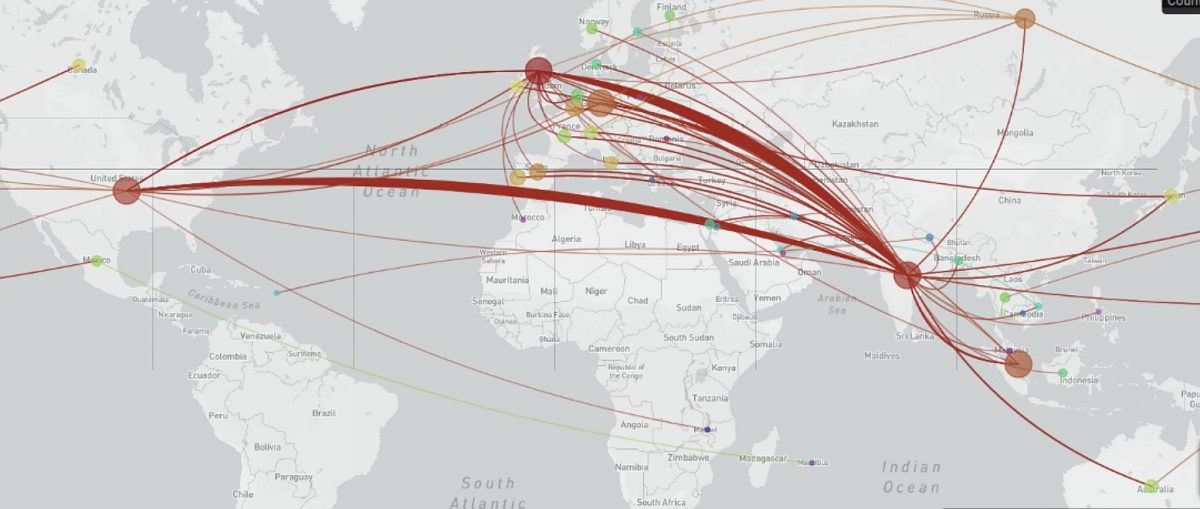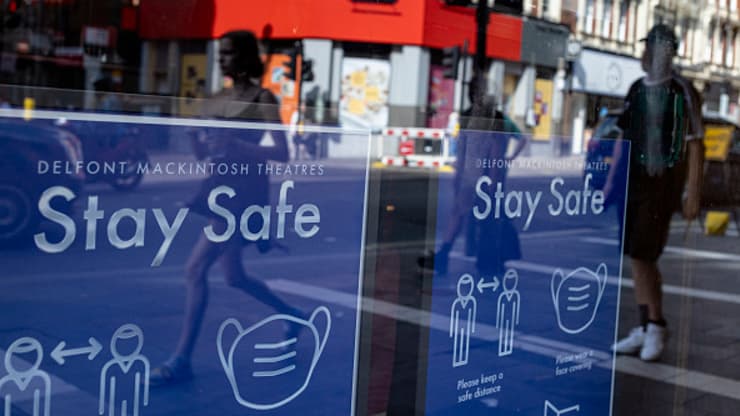A much more infectious variant of the coronavirus has become the dominant strain in the United Kingdom and erased a lot of hard-gained ground in the pandemic fight. The rest of the world will likely face a similar fate in the coming months. What can we do to prepare?
The United Kingdom had been doing well in taking significant steps to emerge from the ongoing coronavirus pandemic. A nationwide mass vaccination effort had delivered both tangible results and real hope to one of the hardest-hit countries in the world. But in the last few weeks, all that has changed, and much of Britain has gone back into various forms of lockdown, as new daily cases have soared.

For most of the months of April and May, new cases had been steadily falling, hovering around 2,000 per day but trending downward overall – ranging from about 1,600 to 2,400 on a moving average. But towards the end of the May, a worrying new trend began taking hold, as the numbers crept upward to 3,000… then 4,000.
By early June, public health officials were sounding the alarm, and within days, the daily cases had doubled from their low-water mark (1,579 cases on May 3), then doubled again. On June 22, the UK recorded 11,625 new Covid-19 cases. The next day, it was 16,135.
What happened?
A MORE CONTAGIOUS VARIANT
Viruses have the ability to adapt and evolve to better carry out their tasks. These variants are genetically similar, but not identical, to the original virus. Tiny mutations can give the virus the ability to survive longer outside of a host, increase its virulence, or make it more easily transmissible, among other phenomena. Virologists have warned of this possibility since the emergence of SARS-CoV-2, and one variant, known as B.1.617.2, or the Delta variant, is raising more red flags than others, largely because of its transmissibility.
The UK seems to be feeling the effects of this more keenly than other countries, but that appearance may be deceptive. Not all countries have the same genetic sequencing capacity that the UK has, so even if those countries have Delta cases spreading, they may not yet be able to identify it as quickly or as accurately as scientists in the UK. But there’s no question that it’s a growing problem, certainly for the UK, and quite possibly for the world – if not now, then in the coming weeks. The European Union’s Disease Control Agency has predicted that the Delta variant would account for 90% of all new cases in the EU by the end of August.
Even currently, estimates are that 60% of all new cases in the UK are Delta. In England, 38,000 cases of just the Delta variant have been recorded in the past 28 days. Scotland’s government, meanwhile, has said that the variant is responsible for “the overwhelming majority” of new cases.

As for the rest of the UK, Northern Ireland’s government has warned that Delta is likely to become the dominant strain, and the Welsh government has pointed out that the Delta variant is driving a rise in infection there, with the country at the start of a third wave of the coronavirus crisis.
In the United States, about 21% of new cases now are Delta, but the variant of the coronavirus is spreading so quickly there, that, much like Europe has forecast, US federal health officials and a new analysis predict that it’s likely the Delta strain will become predominant in the nation within weeks.
“The Delta variant is currently the greatest threat in the US to our attempt to eliminate Covid-19,” the country’s top infectious disease expert, Dr Anthony Fauci, said. He noted that the proportion of infections being caused by the Delta variant is doubling every two weeks.
IS THERE ANY HOPE?
The Delta variant was first identified in India, and soon became a “variant of interest” to epidemiologists and health groups, such as the World Health Organization, around the world.
The adaptability and ‘fitness’ of the Delta variant has given rise to increasing concerns, but the various Covid-19 vaccines have been shown – to varying degrees – to be effective against several coronavirus variants, including Delta, particularly when it comes to preventing in-patient care (i.e., admitted to a hospital because of the severity of the illness).
Notably, the Pfizer and AstraZeneca vaccines, once both doses have been administered, have demonstrated excellent effectiveness against serious illness from the Delta variant (96% and 92%, respectively), according to a recent UK study.
So if they have vaccinated such an impressive percentage of their population, why is this happening?
According to the UK’s Civil Aviation Authority, 42,406 people travelled in both directions between India and the UK in April alone, so experts believe a big part of it is down to travel. It stands to reason that less travel would have meant fewer opportunities for the variant to enter the country.

It’s also believed to be in part due to variable rates of vaccination throughout the UK, along with the rates of single dose vs both doses. For example, in each the UK’s four countries, there is a 20- to 30-point difference in the percentages of those who have received the first dose and those who have received the second dose. There is also a factor in the time it takes for vaccines to reach maximum effectiveness, both in an individual and in a broader population.
Another factor, according to experts, is simply the fact that the Delta is “considerably more transmissible” and that it “eventually finds a way to spread.” The Delta variant is 60% more transmissible than the Alpha variant, which swept through Europe early this year, and was itself more transmissible that the original virus which originated in Wuhan, China.
Dr Muge Cevik, an infectious disease specialist at the University of St Andrews in the UK, said that, with time, there may be a similar pattern of Delta emergence in other countries, adding that this prospect was “much more worrying in countries with low vaccination rates.”
Other experts agreed. “In my mind, it will be really hard to keep out this variant,” remarked Tom Wenseleers, an evolutionary biologist and biostatistician at the Catholic University of Leuven (KU Leuven) in Belgium. “It’s very likely it will take over altogether on a worldwide basis.”
Like Wenseleers, Cevik also said that Delta is quite likely to become the dominant variant in other countries, and possibly worldwide, noting that although the rise could have been slowed or delayed in the UK, preventing it completely was probably never in the cards.
Delta “eventually it was always going to take off” in the UK, she said, noting that even Australia – with among the strictest border controls in the world – had still already seen Delta outbreaks, though relatively small.
“We won’t be able to completely stop variants coming,” she said, explaining that the best approach was to vaccinate as many people in the world as possible.

HOW CONCERNED SHOULD MALAYSIA BE?
Given Malaysia’s low (but rising) rates of vaccination, there is understandably a reasonable cause for concern. If there’s any additional incentive needed for boosting the country’s mass vaccination effort, this would be it, and it certainly shines a harsh spotlight on what many critics say was very poorly utilised time during the first three months following the arrival of the vaccines in Malaysia.
To our south, Singapore has had a particularly noteworthy number of Delta cases identified (823 total, fifth-highest in the world), with a troublesome 92.4% increase – 268 cases – in the past four weeks (data current as of June 23). That spike, by percentage, is the highest in the world over the past month. (By point of comparison, the UK’s increase is 88.7%.)
In both absolute numbers and rates of increase over the last four weeks, Singapore leads the ASEAN region, but Indonesia is seeing a concerning rise of its own, with 168 new Delta cases identified in the last four weeks, an 84.4% increase.
For now, Malaysia’s border closures seem to have served the country well, as only 21 total cases of the Delta variant have been identified here, with just one of those cases having been detected within the last four weeks (identified on May 28, to be exact).
At this point, it appears we can breathe a sigh of relief with regard to Delta, and maintain our focus on rapidly immunising more and more of the population while we still have a bit of time on our side. Because if experts’ predictions are right, it’s not a matter of if the Delta variant will make its presence felt here in Malaysia, it’s just a matter of when.
Without a massive vaccination push, a real potential for disaster looms. Even within the Delta variant, a new mutation, called K417N, has been identified in India that appears to make the virus even more transmissible, and consequently, more dangerous, as the mutated variant could fuel fresh new surges.
Fortunately for Malaysia, the two vaccines studied by the UK (Pfizer and AstraZeneca) – with the results showing them to be highly effective once both doses were given – comprise a substantial majority (about two-thirds) of Malaysia’s total stock of vaccines.
THE SOLUTION REMAINS CLEAR
According to virologists and epidemiologists, including the US CDC, there is one simple way to reduce the devastating effect of the coronavirus, including the Delta variant, and you already know what it is.

Public health experts say vaccination will slow the spread of the new variant and, more importantly, will adequately protect people from severe illness and death from Covid-19, including the Delta variant. The vaccines “are nearly 100% effective against severe disease and death,” CDC Director Dr Rochelle Walensky said in an interview on June 22.
Vaccinations are absolutely critical, agreed experts such as Dr Mike Ryan, executive director of the WHO’s Health Emergencies Programme, as the WHO noted on June 18 that Delta is becoming the dominant variant of the disease worldwide.
“This particular [Delta] variant is faster, it is fitter, it will pick off the more vulnerable more efficiently than previous variants,” Ryan said, “and therefore if there are people left without vaccination, they remain even at further risk.”
As for the virus and its slew of mutant variants, the key to being free of concern is getting vaccinated, and ensuring you get both the first and second jabs. As Dr Ashish K. Jha, Dean of the Brown University School of Public Health told The New York Times, “If you’re fully vaccinated, I would largely not worry about it.”
Dr Paul Offit, Director of the Vaccine Information Centre at a Philadelphia-area hospital in the US, echoed this advice. “We need to vaccinate now,” he urged. “Get everyone vaccinated now.”
"ExpatGo welcomes and encourages comments, input, and divergent opinions. However, we kindly request that you use suitable language in your comments, and refrain from any sort of personal attack, hate speech, or disparaging rhetoric. Comments not in line with this are subject to removal from the site. "























